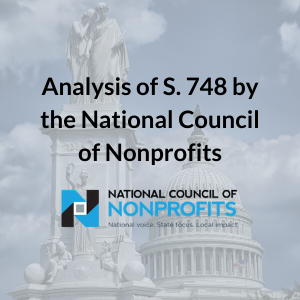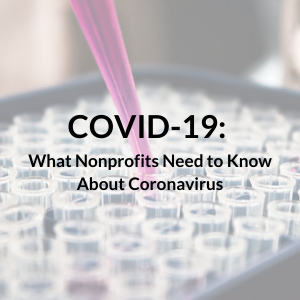Shaeleigh Severino
Analysis of S. 748 by the National Council of Nonprofits
This quick analysis of S. 748 – the Corona Aid, Relief, and Economic Security Act (CARES Act) was prepared by the National Council of Nonprofits. Maryland Nonprofits and its members support NCN and make this assistance possible.
Updated Standards for Excellence Packet on Personnel
We are pleased to report that we have just released the latest update to the Standards for Excellence Packet #8-Personnel Policies, Employee Orientation, Compensation, and Evaluation (includes the 2020 Maryland Nonprofits Model Employee Handbook, available in word...
Navigating Remote Work
We share our sincere wishes for your continued good health and patience as we all navigate these challenging and uncertain times.
What Should My Social Media Policy Look Like?
In this market, the use of social media to further yourself and your group is almost a necessity. How you use social media – whether as an extension of your website, with general news and announcements, or as a personal face for your work – is ultimately up to your organization; but, remember – using social media can change how the public interacts with you.
What Your Nonprofit Can Do Now to Reduce Risks Relating to COVID-19 (Coronavirus)
Coronavirus headlines are alarming. Many communities will be affected even if the spread of the virus remains contained. Beyond handwashing and other competent advice you’ve read over the last weeks that may help prevent the spread of illness, what steps should you take now to protect your staff and the people who depend on your services? This post will answer that question.
The Importance of Having Gift Acceptance Policies
40% of nonprofits have declined a gift. The research cites that the most common reason for turning down gifts is that the gifts came with too many strings attached. Other reasons given in the survey included the practicality of the donation and conflicts between the values of the donors and the values of the nonprofit organization.
ICHRA – Have you looked into the newest offerings for healthcare plans?
Choosing the right health insurance options for you or your organization can be confusing and difficult, but adding an HSA, HRA, FSA, or ICHRA to the analysis can help you figure out what makes the most sense for your organization.
The-All Important Budgeting Process
Each year, we looked closely at the budget categories and proposed amounts in each of the categories—these included pledged gifts, special giving campaigns, events income, and a variety of different types of earned revenue, just to name a few. Unfortunately, in some organizations, the revenue side of the budget is not as well planned (and executed) as the expense side of the budget.
COVID-19: What Nonprofits Need to Know About Coronavirus
Over the past few weeks, coverage of COVID-19 (coronavirus) has dominated the news cycle. While the world has responded with swift mobilization, it is difficult to plan for the effect an outbreak could have on your community. Thankfully, infectious disease experts in Maryland and around the globe have developed advice on how to prepare for an outbreak, both personally and in the workplace.
Crisis and Disaster Planning
Not a week goes by when we don’t hear about some nonprofit that is tackling the impact of some type of disaster. Whether it’s a fire, a health emergency like an epidemic or pandemic, a natural disaster, or a violent act, nonprofits big and small are tackling disasters on an on-going basis. International disaster and relief organizations, hospitals, health and human services, food and housing organizations, and animal rescues are often a part of the first responder teams in many emergencies – and many of these organizations continue to provide support long after the immediate event.









